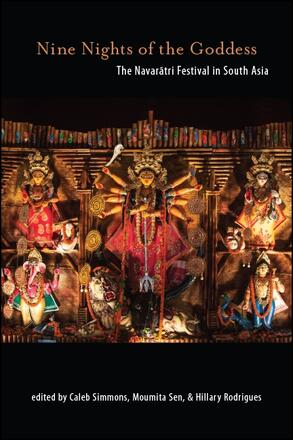
Nine Nights of the Goddess
The Navarātri Festival in South Asia
Alternative formats available from:
Explores the contemporary nature and the diverse narratives, rituals, and performances of the Navarātri Festival.
Description
Nine Nights of the Goddess explores the festival of Navarātri—alternatively called Navarātra, Mahānavamī, Durgā Pūjā, Dasarā, and/or Dassain—which lasts for nine nights and ends with a celebration called Vijayadaśamī, or "the tenth (day) of victory." Celebrated in both massive public venues and in small, private domestic spaces, Navarātri is one of the most important and ubiquitous festivals in South Asia and wherever South Asians have settled. These festivals share many elements, including the goddess, royal power, the killing of demons, and the worship of young girls and married women, but their interpretation and performance vary widely. This interdisciplinary collection of essays investigates Navarātri in its many manifestations and across historical periods, including celebrations in West Bengal, Odisha, Karnataka, Maharashtra, Tamil Nadu, Uttar Pradesh, and Nepal. Collectively, the essays consider the role of the festival's contextual specificity and continental ubiquity as a central component for understanding South Asian religious life, as well as how it shapes and is shaped by political patronage, economic development, and social status.
Caleb Simmons is Assistant Professor of Religious Studies at the University of Arizona. Moumita Sen is a Postdoctoral Fellow at the University of Oslo, Norway. Hillary Rodrigues is Professor of Religious Studies at the University of Lethbridge, Canada. His books include Ritual Worship of the Great Goddess: The Liturgy of the Durgā Pūjā with Interpretations, also published by SUNY Press.
Reviews
"…Nine Nights is credible research on the nine auspicious nights of the Navarātri. The narrative of the authors and their experiences in conducting the research make the book an engaging text. It is an informative read for those inquisitive about the festival's textual sources and the ways of practicing the festival that may or may not reflect the textual descriptions, making the book a valuable contribution to the existing literature on tradition of Hindu festivals." — Reading Religion
"…Nine Nights of the Goddess is a masterfully edited and handsomely produced collection of studies of outstanding scholarship on a very popular Hindu religious festival … This is undoubtedly a scholarly magnum opus on the Magna Mater of Hindu South Asia." — Nidān
"This is a unique collection of marvelously diverse perspectives on one of the most prominent contemporary Hindu festivals. Even those who know much about Durgā Pūjā should prepare to be fascinated by the work of these scholars." — Patricia Dold, Memorial University